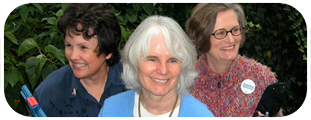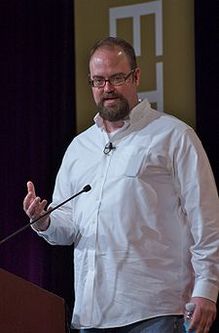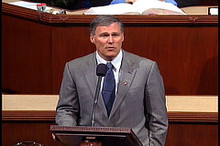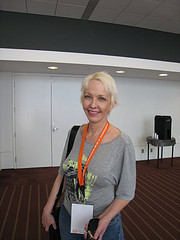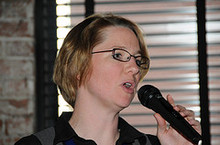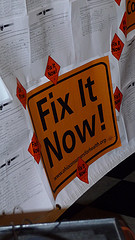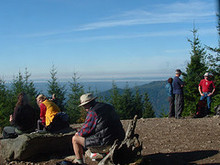If the legislature acts next year, the State of Washington could join the "Move Your Money" campaign that individuals have been participating in over this last year, in this case moving state money from deposits in the large banks to deposits in our own newly formed Bank of Washington.
Last session Rep. Bob Hasegawa (11th LD)
sponsored HB 3162 to create a state owned bank of Washington. Co-sponsors are representatives Zach
Hudgins (11th), Maralyn Chase (32nd), Geoff Simpson (47th),
Mary Lou Dickerson (36th) and Roger Goodman (45th). There was no time to address the bill
last session but this upcoming session could be the time to pass this timely bill, after which it would go to the voters for approval.
HB 3162 makes provision for a state-owned bank that would be overseen by the State Treasurer, allow the State Treasurer to fund the bank with state funds and provide the state bank with the same types of authority to operate as a private bank chartered by the state.
Washington State is one of the only states that constitutionally does not allow the state to lend money. As a result, it is also one of the states that is the least effective in providing economic development support, which becomes quite apparent in a deep recession such as the one we are currently experiencing. This means that in additional to passage of the bill by the legislature, the voters will then need to amend the state constitution to allow a state institution such as this new state-owned bank to loan money.
Modeled after the Bank of North Dakota

The bank is modeled after the Bank of North Dakota (BND), which is the only state-owned bank in the nation. BND was established by legislative action in 1919 to promote agriculture, commerce and industry in North Dakota. BND operates as a bankers' bank, partnering with private banks to loan money to farmers, schools and small businesses and purchasing municipal bonds from public institutions. After a few rocky decades, BND has bi-partisan support in a state that has voted for the Republican nominee in each of the last 10 presidential elections. The current governor, Republican John Hoeven, was the President of BND before becoming governor.
The Bank acts as a funding resource in partnership with other financial institutions, economic development groups and guaranty agencies. During the Depression, the Bank held mortgages for farmers that would otherwise have lost their farms. It allowed them to live on the farms and then buy them back when the good years returned and they could pay back what they owed. During this current recession, North Dakota has the lowest unemployment in the country (3.6% vs. 8.9% for Washington State) and the BND is credited with being a large part of that.
Leveraging Public Resources for the Benefit of the State
There are two interlocking reasons why a Bank of Washington would be a great investment in our state. 1) The debt service on the money that the state deposits in this bank would stay here rather than going to the large banks, none of which are local. 2) The money deposited in the Bank can be used and leveraged to provide low or no-interest student loans, access to capital for small businesses, investment in public infrastructure like roads, water/sewer, schools and housing, and for targeting economic development initiatives.
To elaborate on #1 above, the amount of state money spent on debt service, Ellen Brown, author of "Web of Debt" writes at Yes Magazine in March, 2009 that she estimated that various governmental institutions in the state of Michigan, i.e. the state, cities, counties, state universities, etc., paid about $1 billion in interest and at the same time had a $1 billion deficit. Hm. Wonder how we could better use that interest money?Next Steps for the Bill
HB 3162 was given a preliminary hearing in March in front of the Financial Institutions and Insurance Committee. Hasegawa is working to finalize the content of the bill this summer and to work with other legislators to obtain additional, bipartisan support. During the fall, there will be public sessions to raise awareness around the state.
If the bill is passed by both houses of the legislature and signed by the Governor, it will require approval of the voters of the proposed amendments to Articles VIII and XII of the state constitution, allowing the state legislature to create a state bank that may make decisions to lend, borrow, and invest state monies.
Next Steps for Organizers
- Go to Representative Hasegawa's website to be added to Bob's state-owned bank stakeholder list and/or to watch a short video about the BND.
- Order a longer PBS video to learn more about how and why the bank came to be, the hurdles encountered, and the current extraordinary role that the bank plays in the economic vitality of North Dakota today, go to Prairie Public's website.
- Talk about this bill to everyone you think might be interested and/or show the movie above. This bill will be good for the state, will provide support for serious economic development activities and will be a great way to get people engaged in improving our quality of life here in Washington State.
- Ask your legislators about their thoughts on creating a State-owned Bank in Washington. Share your thoughts with them.
